Disposing of used cooking oil properly is not just about keeping your pipes clear; it’s about contributing to a healthier environment and adhering to the Food Safety Act’s guidelines.
For commercially produced waste oil, you must contact a company such as ourselves to dispose of your used oil, no matter how small the amount is, it must be disposed of legally and waste transfer notes must be retained for environmental health inspections to prove the oil has been disposed of legally.
How to Dispose Of Cooking Oil From Households
For households using small volumes of oil from the frying pan, you should always try and take the oil to a local recycling centre, where this is not possible, the oil can be transferred to a disposable container and put with the general household waste.
Whether it’s vegetable oil used in a stir fry or frying oil from deep frying your favorite fried chicken, understanding the food safety act and how to dispose of cooking oil, recycle cooking oil, or even reuse cooking oil can make a significant difference.
Pour Into Disposable Container
Pouring the waste oil directly into a disposable container is a straightforward method for cooking oil disposal. Once the oil cools, transfer it into an old glass jar, milk carton, or any sturdy container.
Before disposal, ensure the container is tightly sealed to prevent leaks that could attract pests or create a mess in your general waste bin. This method is particularly effective for used frying oil, or any leftover cooking oil you have after meal preparation.
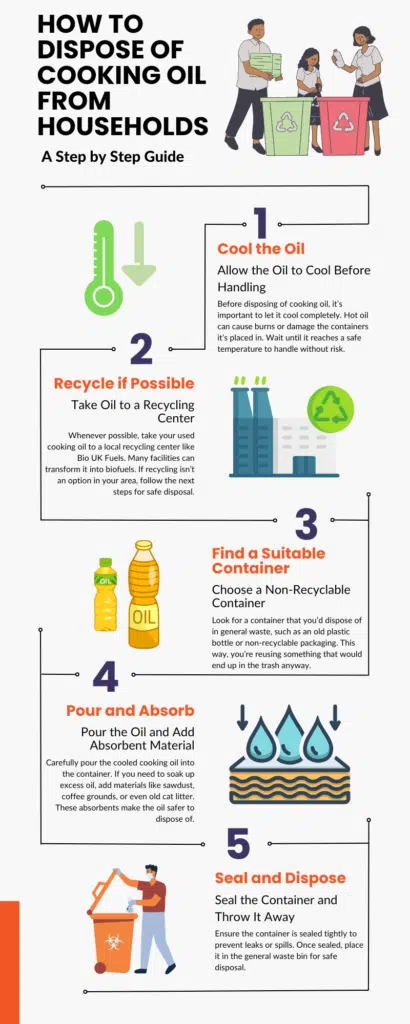

Additional Tips For Getting Rid Of Cooking Oil From The Home
Always allow the oil to cool before attempting to pour it into any container to avoid burns or melting the container.
Utilise absorbent materials like paper towels or cat litter at the bottom of the container to soak up any potential leaks, ensuring a safer disposal into your general waste bin.
For oils used in foods like stir fry or deep frying, consider straining the oil through a coffee filter to remove food scraps, which can enhance the safety and cleanliness of the disposal process.
Pour Small Amounts Into Trash
Disposing of small amounts of cooking oil, such as that left from frying foods such as bacon or just a bit of old cooking oil, can be done directly into your Rubbish bin, provided it’s done correctly. Absorb the oil with a paper towel, towels, newspaper, or cat litter to prevent it from leaking through the bin bag and attracting pests.
This method works well for minimal quantities of oil that wouldn’t justify the use of a larger container for disposal.
Will Boiling Water Help?
A common misconception is that pouring boiling water down the drain after oil can help prevent clogs. However, this method does not effectively address the issue; the hot water might temporarily liquefy the oil, but as it cools down in the pipes, it can solidify and cause blockages in your home’s plumbing or even the local sewage system.
It’s crucial to follow proper procedures for oil disposal to avoid damaging your septic system or contributing to larger environmental issues in local waterways.
Contact a Waste Disposal Company
For significant amounts of used cooking oil, especially from commercial kitchens or after a big event, contacting an oil waste company is advisable to properly dispose of the oil.
Like Bio UK Fuels, these companies specialise in the safe and environmentally friendly disposal of waste cooking oil, ensuring it doesn’t end up clogging pipes or harming local ecosystems.
We can provide a designated storage tank, secure containers for the collection and disposal of large volumes of oil. If you have over 60 litres ready for disposal, then use our nationwide recycling service, call us on 01709 373248
Mix with Other Solid Waste Materials
Mixing used cooking oil with solid waste materials like cat litter, sand, or sawdust can solidify the oil, making it easier and safer to dispose of in your compost pile general waste bin. This method is particularly useful for preventing leaks and spills in your waste bins and ensuring that the oil does not escape into the environment during the collection and disposal process.
Store Properly and Then Dispose Along with Other Household Waste
Proper storage of used cooking oil is crucial before disposal. Storing the oil in airtight containers, such as glass jars or sealable plastic containers, can prevent leaks and odors.
Once properly stored, the oil can be disposed of with other household waste, following your local council’s guidelines for waste disposal to ensure compliance with the Food Standards Agency and environmental regulations.
Ask your Local Restaurant or pub if they can help with household oil Disposal
All restaurants and local businesses that produce waste cooking oil participate in recycling programs that involve turning it into biodiesel, a renewable energy source for diesel engines. This option not only helps dispose of large quantities of oil but also contributes to a circular economy by transforming waste into valuable resources.
Contacting a local restaurant to see if you could put your household waste with their waste oil and then a company like Bio UK Fuels can provide a free of charge oil collection
HOW DO YOU DISPOSE OF COMMERCIAL WASTE OIL?
When disposing of your commercially used cooking oil, unlike in domestic households, there is only one way to legally do this.
As a business operating in the food industry, you have a legal requirement and environmental responsibility to dispose of your used cooking oil, but you have to use a licenced food waste and oil collection service, so no need to worry about sorting it yourself.
Simply contact a licenced waste oil collection service like ours, select a collection date and store your used cooking oil ready for collection in either the container the fresh oil came in or in the leakproof containers that will be provided by us or which collection agency you use.
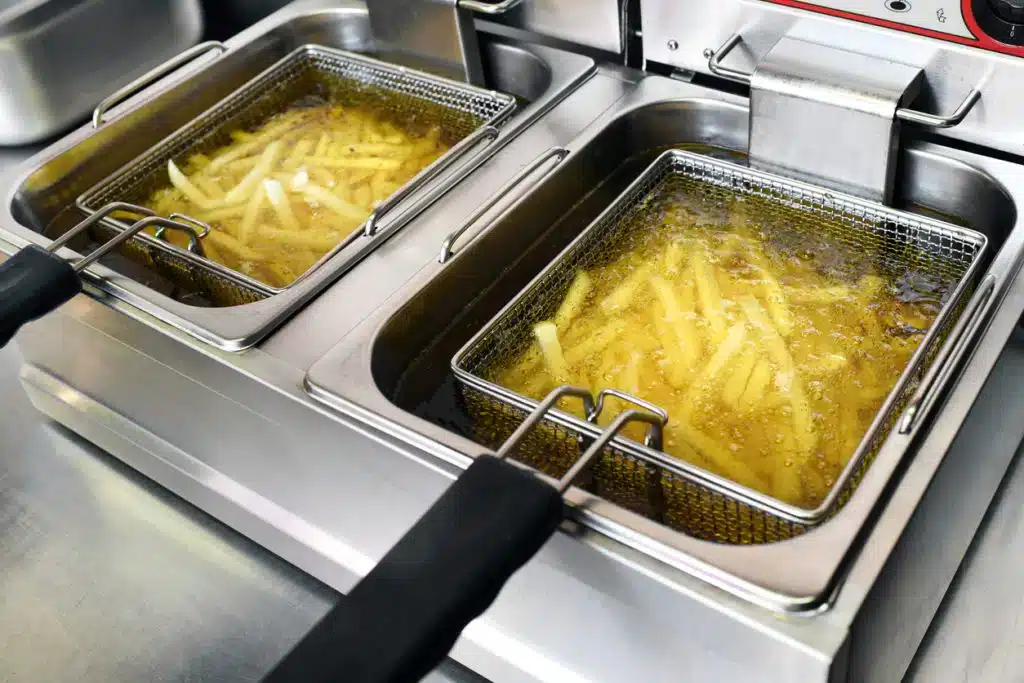

Use a Grease Disposal System for Commercial Kitchens
For commercial producers of waste cooking oil, investing in a grease disposal system can offer a convenient and hygienic way to dispose of cooking oils and grease.
These systems typically include a receptacle for storing oil until it can be properly disposed of or recycled. They’re designed to prevent spills, leaks, and odors, making them an excellent option for businesses that frequently cook with oil.
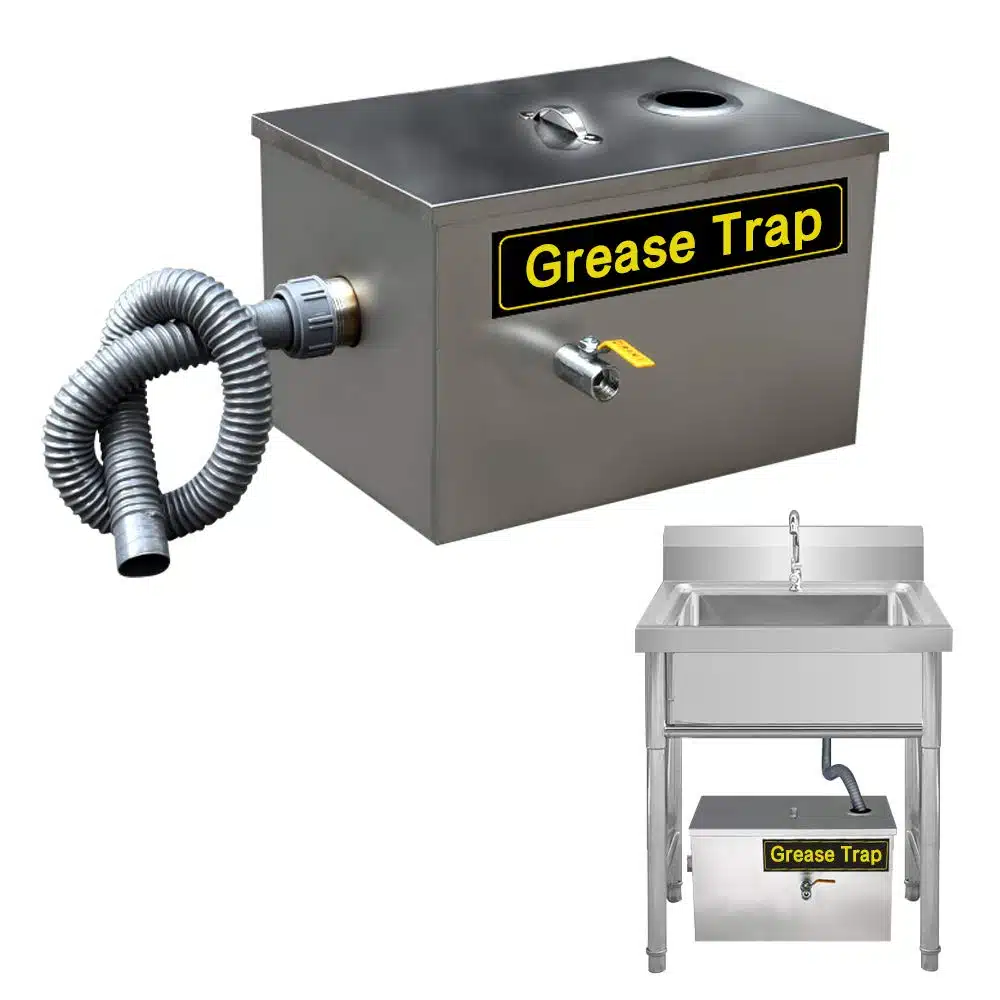

Storing Your Used Cooking Oil Legally
Store In The Correct Containers
For households, using glass jars are ideal for storing used cooking oil due to their durability and non-reactive nature. Ensure the jars are clean and dry before adding oil, and label them with the date and type of oil. This method helps monitor the quality of the leftover oil and prevents the use of spoiled oil, which can be harmful.
For Businesses, you can contact BIO UK Fuels to get a storage barrel designed for used cooking oil storage, these provide the most clean and effective storage and transportation of the waste oil. They can be clamped and seal for safe storage and prevent any vermin from getting to the waste oil. The containers the fresh oil comees in can be used to store the waste, but care must be taken when filing and the oil must be cold when doing so.
Mistakes to Avoid When Disposing of Used Cooking Oil
Pouring oil down the drain: This can lead to severe plumbing issues and environmental harm.
Improper storage: Used cooking oil should be stored in tightly sealed containers to prevent leaks and odors.
Ignoring local disposal regulations: Always follow your local council’s guidelines for the disposal of cooking oil to ensure compliance with environmental standards.
When Reusing Cooking Oil, Keep Track of Its “Expiration Date”
Cooking oil can degrade over time, especially when reused. Monitor the smell, color, and texture of the oil, and dispose of it once it shows signs of spoilage. This practice ensures food safety and prevents the consumption of degraded oils, which can be harmful to health.
What Are The Reasons To Recycle Used Cooking Oils Correctly?
Recycling used cooking oils is essential for several reasons:
Environmental Protection: Proper recycling prevents oils from entering and harming local waterways and wildlife.
Sustainable Energy: Recycled oils can be converted into biodiesel, a renewable energy source that reduces reliance on fossil fuels.
Compliance with Regulations: Following local and national guidelines for oil disposal ensures businesses and households avoid potential fines and contribute to community health.
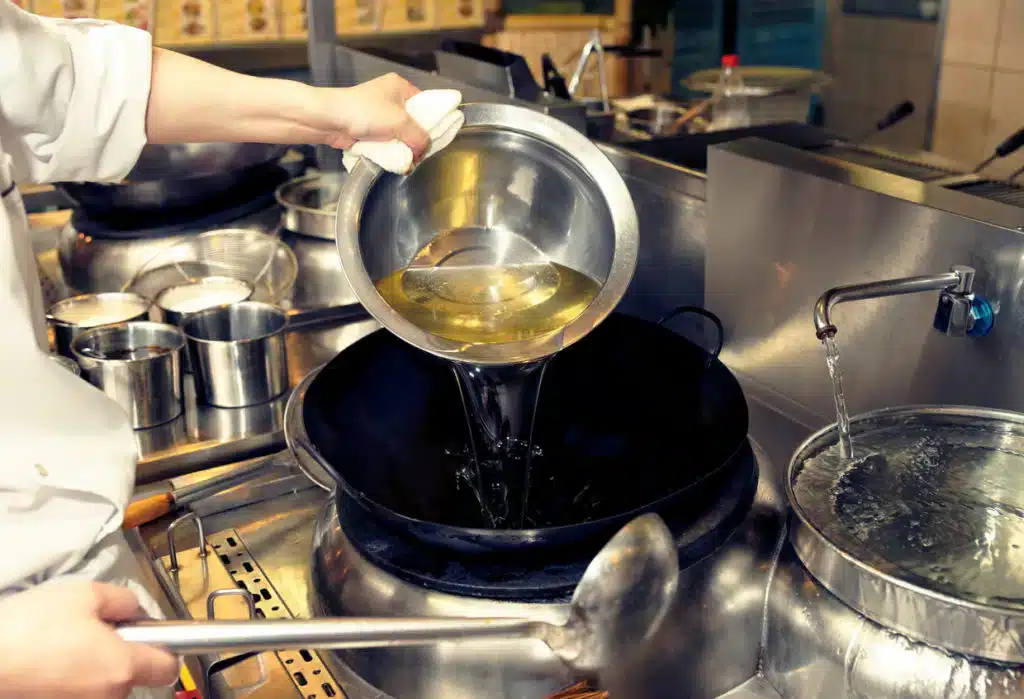

Contact Us To Arrange A FREE Collection
Bio UK Fuels offers a free collection service for businesses and households looking to recycle large quantities of used cooking oil.
HOW TO DISPOSE OF USED COOKING OIL IN THE UK?
How you should dispose of your used cooking oil depends on what you are using your cooking oil for. Although all should be carried out in the most environmentally responsible way, businesses in the food industry have a legal responsibility to dispose of their used cooking oil through an authorised collection agency, such as Bio UK Fuels. However, households can still responsibly dispose of their used cooking oils but this can be carried out in different ways. Here we’re going to outline the different methods you can dispose of your used cooking oil depending on how you use it.
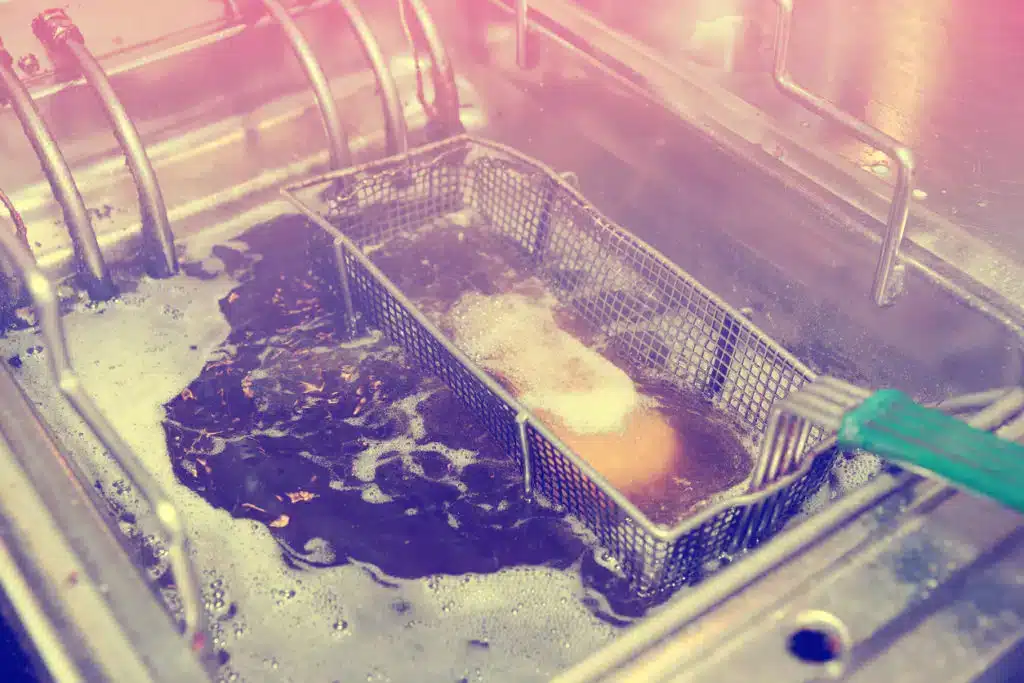

DISPOSING OF USED COOKING OIL IN DOMESTIC HOUSEHOLDS
In the UK, there is a multitude of ways in which you can environmentally and safely dispose of your used cooking oil when using it in your home. Always take your used cooking oils and fats to a local recycling centre for safe disposal, where this is not possible and for very small amounts, the general waste bin can be used.
Do Not Pour Used Cooking Oil Down the Sink
The number one rule we advise everyone is to not dispose of your used cooking oil down the drain or to pour it outside. This is for several reasons, one of the main ones being that after you have poured used oil down your drain it solidifies and cools blocking your drains. This causes bad odours, clog pipes and drainage problems, which means a hefty plumbing bill!
Yorkshire water were fearing for the sewers over the Christmas period as this is when most Oil contamination hits the sewers from housholds. This fatberg fear from household oil contamination was reported on by the BBC, explaining yourkshire waters concerns about households tipping oils and fats into sinks over the festive period
As well as this in extreme cases, it can cause local problems, when your oil goes into your local sewage system it can mix with calcium in sewage water creating fatty clumps called ‘fatbergs’. When left to grow they can cause serious environmental problems and blockages in sewer systems costing thousands to remove. Check out this example of a fatberg on display in the Museum of London weighing a whopping 130 tonnes.
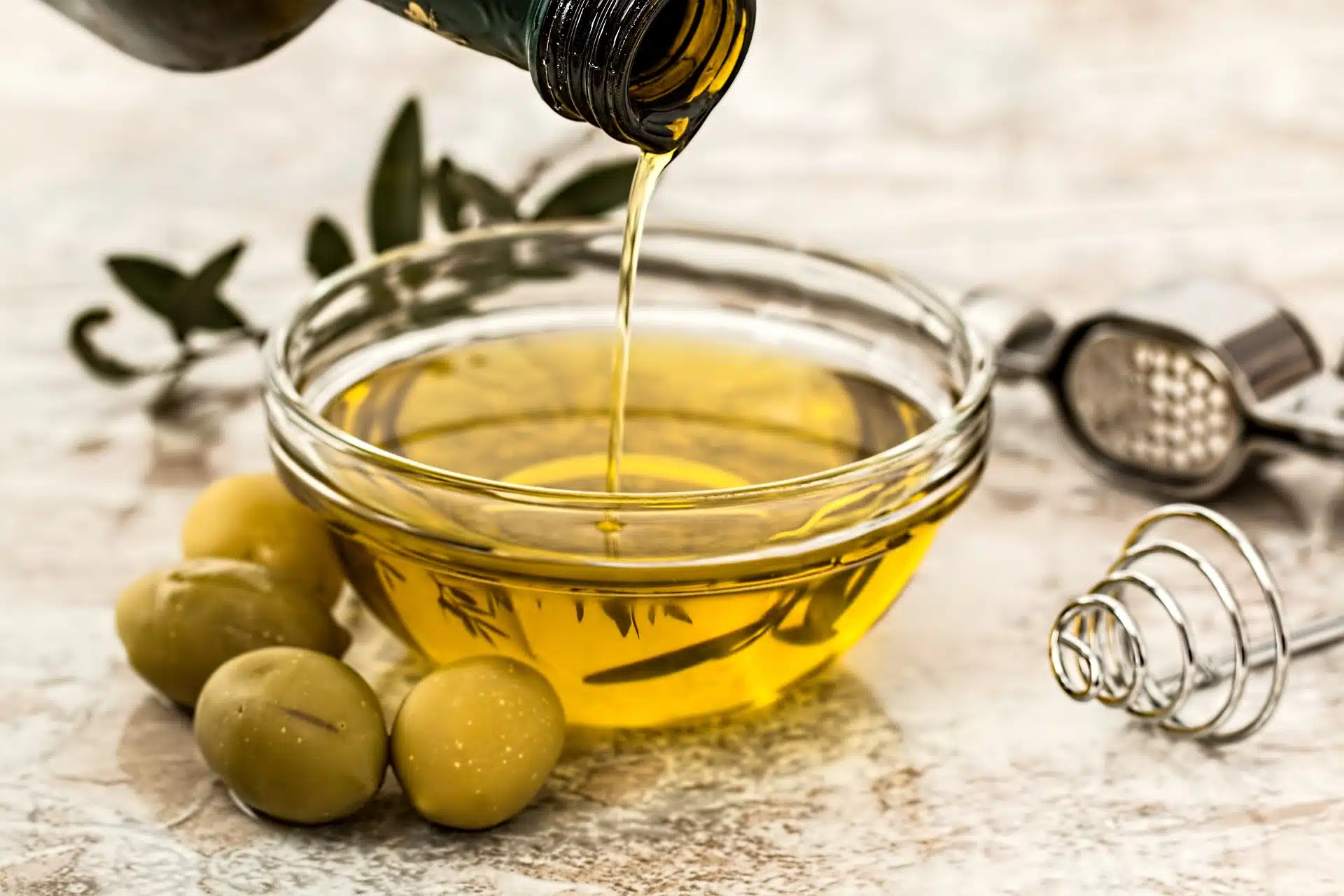

Cool until solid
If you have a very small amount of used cooking oil, such as fat from frying bacon, you can choose to place it into your household bin, but only when stored correctly. Simply place your oil into a sealed container first, put it out of the way and leave it to solidify. Once completely cooled and solid, it can be placed into your bin. This will prevent leakage of the used cooking oil from contaminating other rubbish in your bin.
Recycle Your Used Cooking Oil
The best way to dispose of your used cooking oil in a domestic household is to recycle it. Our free waste oil collection service is aimed at businesses that use and dispose of large amounts of used cooking oil such as restaurants, schools and pubs as domestic households tend to only use small amounts. However, if you are a household with 60 litres or above you can use our recycling service. If not, contact your local council to see where the nearest drop off point is located
We have a minimum collection amount of 60 litres. Please save at least this amount up by putting the waste oil back in the containers the fresh oil has come in.
Once you have at least 60 litres ready for collection, call 01709373248 or email to arrange a collection. We have a driver in your area once a week.
We can provide you with all the documentation you need with each collection and provide a storage barrel if you need one when we do the first collection.
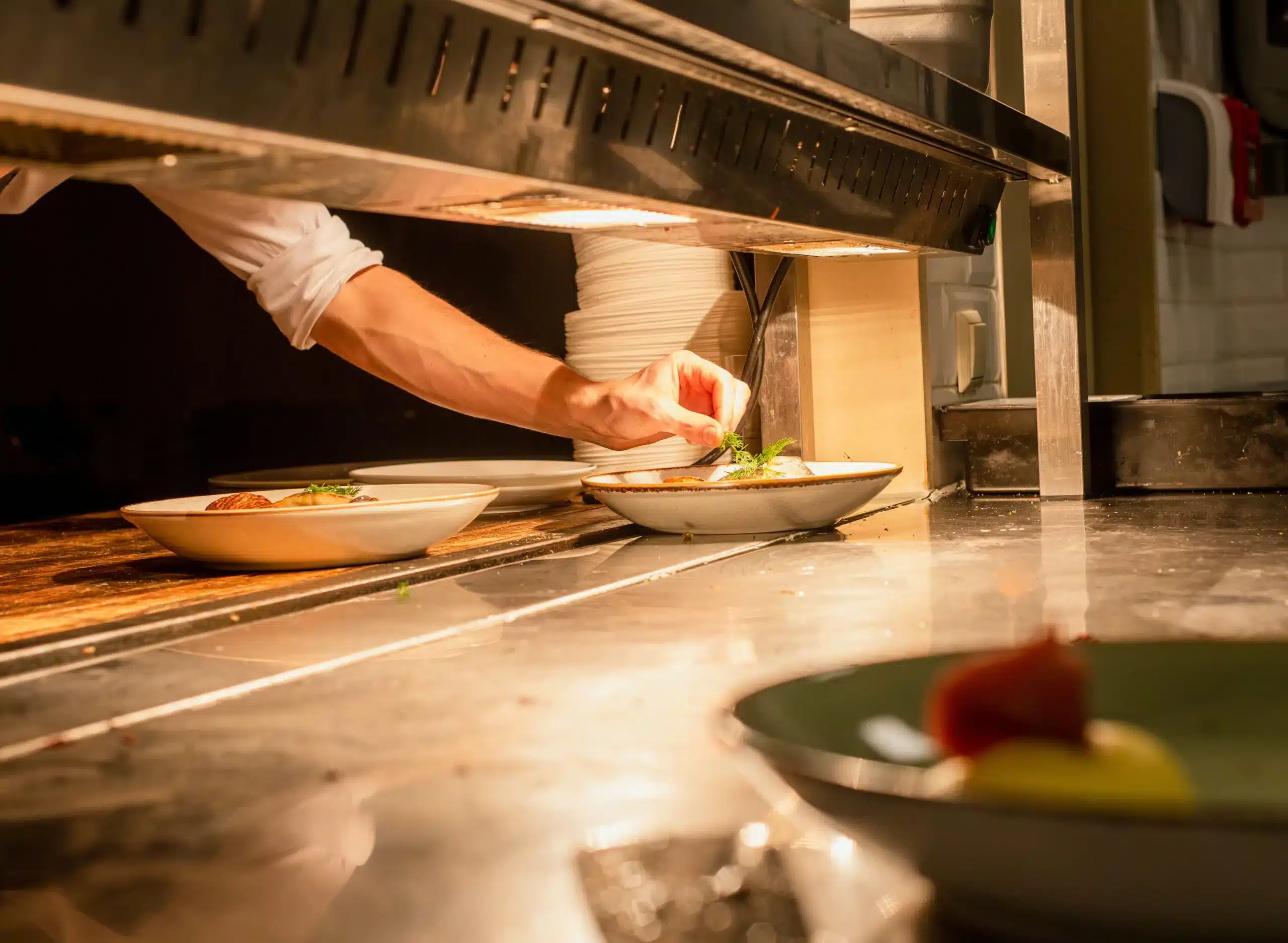

WHAT HAPPENS TO USED COOKING OIL ONCE IT HAS BEEN RECYCLED?
Your waste cooking oil that is collected is transported, usually in a low-emission transport vehicle, to the closest recycling facility. There it goes through several processes from cleaning, to filtering to a special chemical reaction which changes it into usable biofuels.
Biofuels can be used exactly as traditional diesel fuels are; this is usually to power vehicle engines but they can also be used for powering electricity and manufacturing machinery.
At Bio UK Fuels we turn the waste oil into a useable fuel that provides an environmentally friendly alternative to diesel. We retail this biodiesel from our depot in Sheffield . To find out more about our processes visit our FAQs page on our website.
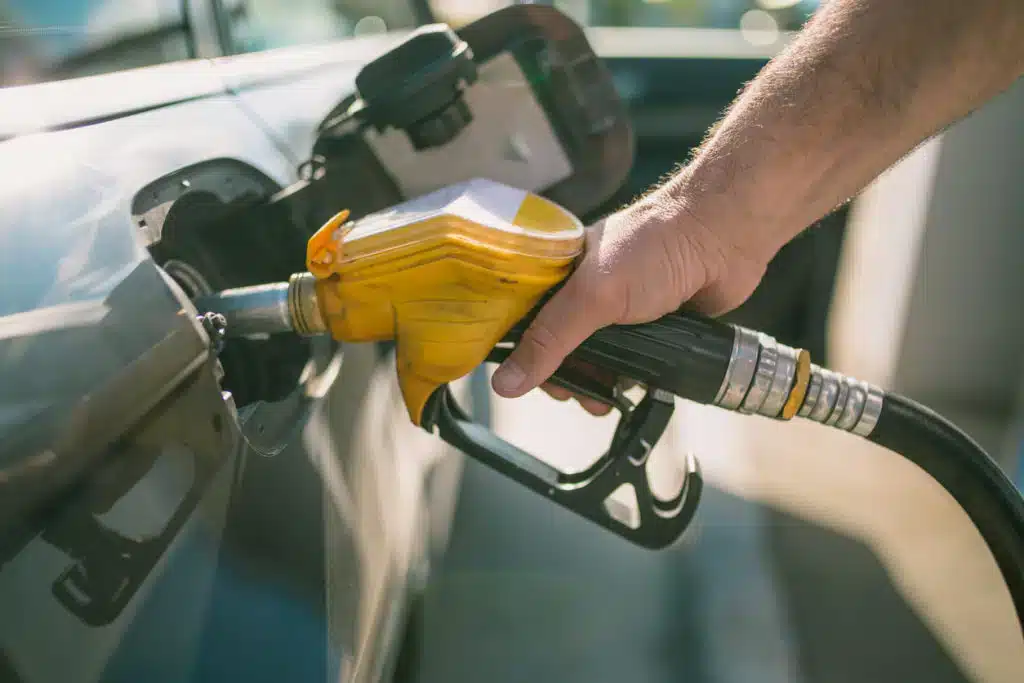

FREE WASTE COOKING OIL COLLECTION AND RECYCLING SERVICE FROM BIO UK FUELS
At Bio UK Fuels we offer a free waste oil collection and responsible recycling service to businesses across the UK. As part of our services we collect and recycle your waste fats and oils into a sustainable alternative to diesel helping to create a more sustainable future for our planet.
Schedule a collection with us today tailored to suit both you and your business. Simply call us on 01709 373248 or complete our online contact form to find out more about our services.

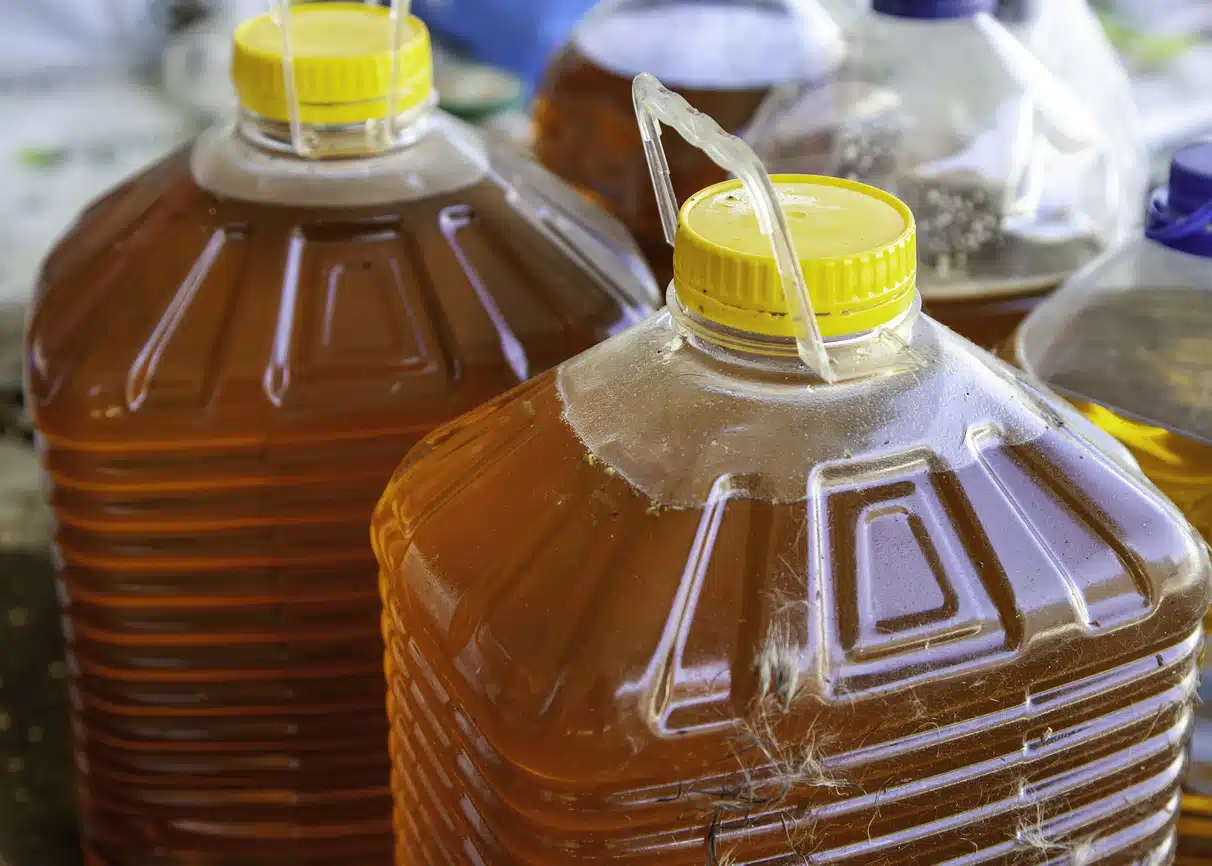

Excellent аrticle. I definitely appreciate this site.
ᛕeep it up!
Very good information can be found on blog.
What’s Happening i’m new to this, I stumbled upon this I’ve discovered It
positively helpful and it has helped me out loads.
I’m hoping to contribute & assist different customers like its helped me.
Good job.
not working
interesting post